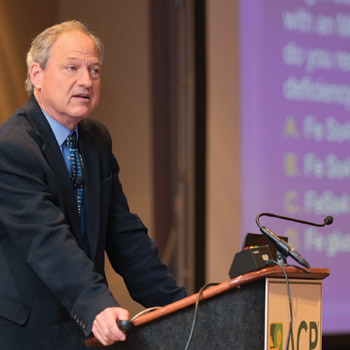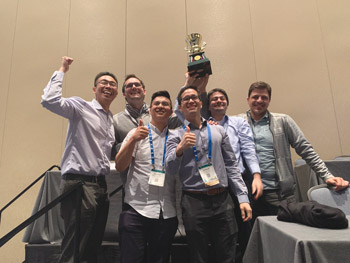Changes made to opioid prescribing information
This column reviews details on recent recalls, warnings, and approvals.
Recalls and warnings
A recall of two lots of the fentanyl transdermal system (12 µg/h transdermal patches) by Alvogen, Inc. due to incorrect labeling. Some cartons labeled 12 µg/h contained 50 µg/h patches, although individual 50 µg/h patches were correctly labeled.
A recall of 35 lots of bulk losartan potassium tablets USP (six lots of 25 mg strength; 29 lots of 100 mg strength) by Teva Pharmaceuticals USA, Inc. due to the detection of N-nitroso-N-methyl-4-aminobutyric acid (NMBA), a potentially cancer-causing impurity found in six lots of active pharmaceutical ingredient. The lots were sold exclusively to Golden State Medical Supply.

A recall of one lot of bevacizumab injection (1.25mg/0.05mL) by AmEx Pharmacy due to potential damage to the eye while the 31-gauge needle is in the eye. The product's syringe may become difficult to express and may cause injury to the patient when additional force is applied. The company has received three reports of such difficulty with the syringe, and two cases resulted in an adverse drug event.
A recall of 40 repackaged lots of losartan potassium tablets USP (25 mg, 50 mg, and 100 mg) by Legacy Pharmaceutical Packaging, LLC due to the detection of trace amounts of NMBA.
A warning that patients and families should not use unapproved medical devices (e.g., smartphone apps) to help assess or diagnose head injuries. These devices can result in an incorrect diagnosis and potentially put people in danger. All of the medical devices that have been cleared or approved by the FDA to aid in the diagnosis, treatment, or management of concussion require an evaluation by a health care professional.
Approvals
Romosozumab-aqqg (Evenity) to treat osteoporosis in postmenopausal women at high risk of fracture. One dose of the drug consists of two injections, one immediately following the other, given once a month by a health care professional. More than 12 doses should not be used, as the drug's bone-forming effect wanes after 12 doses. Common side effects include joint pain, headache, and injection-site reactions. A boxed warning states that the drug may increase the risk of heart attack, stroke, and cardiovascular death and should not be used in patients with a heart attack or stroke within the previous year.
Dolutegravir and lamivudine (Dovato) as a complete regimen for the treatment of HIV-1 infection. The drug, taken as one daily tablet, is indicated for adults with no antiretroviral treatment history and with no known or suspected substitutions associated with resistance to its individual components. It is the first FDA-approved two-drug, fixed-dose, complete regimen for HIV-infected adults who have never received treatment for HIV. The most common adverse reactions were headache, diarrhea, nausea, insomnia, and fatigue. A boxed warning cautions that patients coinfected with hepatitis B should add additional treatment for their hepatitis B or consider a different drug regimen.
Miscellaneous
Required changes to prescribing information for all opioid analgesic medicines used in the outpatient setting. Although there is no standard opioid-tapering schedule suitable for all patients, the changes will provide clinicians with expanded information on how to safely decrease the dose in patients who are physically dependent on opioids. The labeling changes recommend that clinicians consider factors including the dose of the drug, the duration of treatment, the type of pain being treated, and the physical and psychological attributes of the patient.
A final rule on over-the-counter (OTC) hand sanitizers. The rule finalized the FDA's previous determination that 28 active ingredients, including triclosan and benzethonium chloride, are ineligible to be evaluated for use in consumer antiseptic rubs. Three active ingredients (benzalkonium chloride, ethyl alcohol, and isopropyl alcohol) will be deferred from further rulemaking to allow for ongoing study and data submission. Fewer than 3% of the marketplace will be affected by the issuance of this final rule, as most OTC hand sanitizers use ethyl alcohol as the active ingredient.
First-time generic approvals
Naloxone hydrochloride nasal spray (4 mg/spray) for the emergency treatment of known or suspected opioid overdose. (Brand name: Narcan)
Ambrisentan tablets (5 mg, 10 mg) to treat pulmonary arterial hypertension. (Brand name: Letairis)
Bepotastine besilate ophthalmic solution (1.5%) to treat itching associated with signs and symptoms of allergic conjunctivitis. (Brand name: Bepreve)
Note: The FDA states that drugs are not always commercially available immediately after approval.




